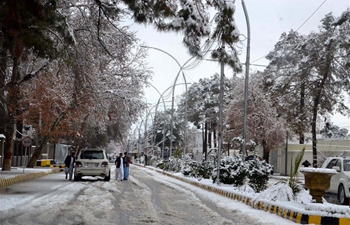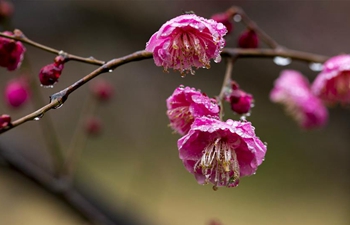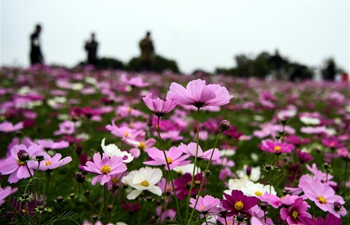LHASA, March 3 (Xinhua) -- Phurchung, 52, rushes with incredible agility through creeks and rubble on the grasslands in Changtang, 5,000 meters above sea level, watching over the "golden treasure."
He is the head of one of the 73 management stations across the Changtang National Nature Reserve, covering an area of 298,000 square km in the north of Tibet Autonomous Region.
It is China's biggest and highest reserve and home to a variety of wildlife species. The Golden Wild Yak is one of them and perhaps the rarest.
An adult golden yak weighs over one ton. With lion-like fur, unlike its dark brown cousins, it is truly a magnificent animal. There are only around 200 of them on Earth, all found here.
The golden beast first showed up in travel notes a century ago, but it was not until 1987 that biologists were convinced they were real.
Phurchung was born in a nearby village and became a wilderness ranger in the 1990s. He now earns 2,000 yuan a month, with a living allowance of 300.
Unlike his ancestors who worshiped yak in cliff paintings scattered all over the grasslands, Phurchung roams the reserve to protect them.
"I traveled much faster when I was younger," he said. "With binoculars, a motorbike and a few supplies, I could cover hundreds of kilometers a day."
Over the decades, Phurchung has patrolled every corner of the reserve. "I know the names of every snow mountain and every lake."
The grasslands in Changtang were once hunting ground for villagers living nearby, but golden yaks have always been off limits. Legend says they were dowry of the Snow Mountain goddess.
During the 1980s, local residents' lives were improved and more options became available. Hunting became obsolete. In 1990, China adopted a law to protect wildlife, banning hunting across the country.
Poaching, however, threatened wildlife as well as rangers. Phurchung recalls his encounters with armed poachers. Once a gun was held against his chest, and he chose to stay until the poachers ran away.
He also helped local forest police catch several poaching groups. The largest one had more than 20 members.
"Protecting them is something worth my life," Phurchung said. His son in law works at another station, inside a habitat of endangered Tibetan antelope.
The number of poaching cases is declining, thanks to heavy punishment. Wildlife, on the other hand, prospers in the reserve.
"We have 60,000 Tibetan antelope and 15,000 Tibetan wild donkeys, much more than what we had 20 years ago. The number of golden yaks is also increasing," said local forest police chief Champa Tsering.
Villagers were advised to resettle in areas with lower altitudes. Fences on animal migration routes were removed, and herdsmen who raised less livestock were given compensation from the government.
A total of 780 farmers and herdsmen were hired as wild rangers in the reserve. Phurchung insisted on staying, even though he could have retired when he turned 45.
"I still have lots to do and tell the newcomers," he said. "As long as I can walk, I'm still the guardian of this land."
















